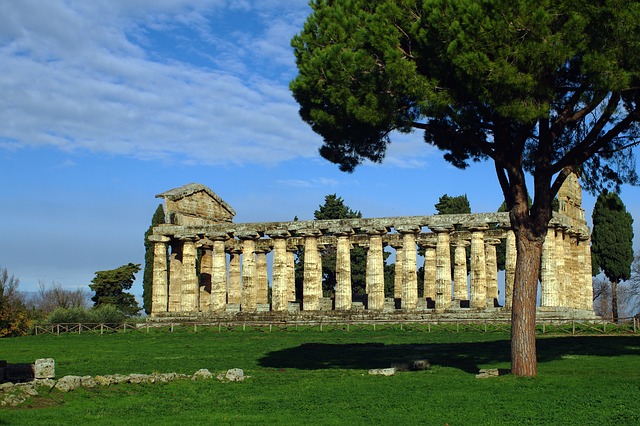
Paestum Archaeological Park – Hera, Neptune and Ceres
Paestum was probably one of the largest Greek cities on the coast of the Tyrrhenian Sea in Magna Graecia. After its foundation by Greek colonists under the name of Poseidonia, it was conquered by the Lucanians and finally by the Romans, who gave the city its current name.
Excavations of Paestum are known for their three ancient Greek temples, which are still in an excellent state of preservation. These three magnificent Doric temples are dedicated to Poseidon, Hera and Ceres.
The Temple of Hera is the oldest of the three temples, built around 550 BC. It is sometimes called the Basilica, based on an error made by some archaeologists of the past who thought it was a Roman public building, in the sense that the Roman term indicates a place used as the seat of the court and the assemblies held by the citizens.
The Temple of Neptune is considered as the most perfect example of Doric Templar architecture in Italy and Greece. The attribution to Neptune is due to the scholars of the ‘700 who believed the building was built in honor of the god Poseidon-Neptune who gives name to the city. Recent studies attribute it instead to Apollo, in his role of doctor.
The Temple of Ceres (or Athena) was built about fifty years before the Temple of Neptune and 50 years after that of Hera. It has some peculiarities that distinguish it from the other two temples and make it one of the most interesting of Greek architecture. The high pediment and the Doric frieze composed of large blocks of limestone make this building unique.
In addition to the three temples, the central part of the Paestum site is the Roman Forum, with extensive foundations of various public and private buildings. Finally, in the northwest of the forum is a small Roman amphitheater, of which only the southern half is visible.
Did you like this curiosity? If you want to discover more secrets, legends and mysteries, download the curiosity app. Download Secret Maps!
And if you want to listen to something interesting, try the first Travel Podcast Platform. Try Loquis!

